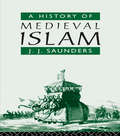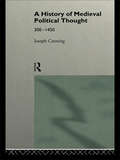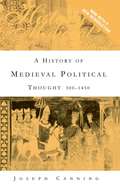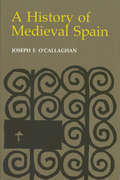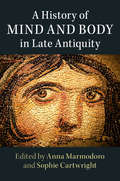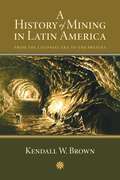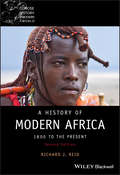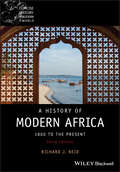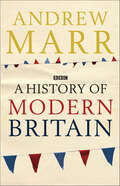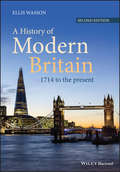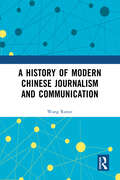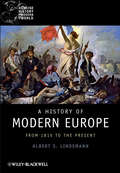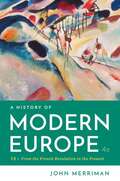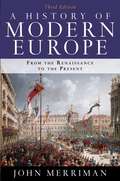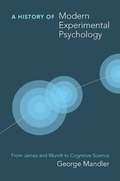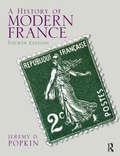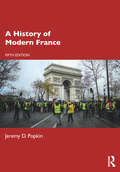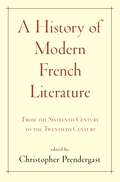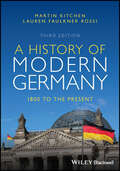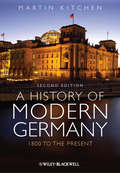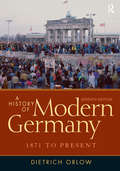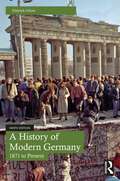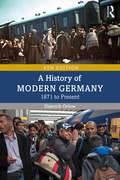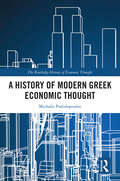- Table View
- List View
A History of Medieval Islam
by John Joseph SaundersThis is an introduction to the history of the Muslim East from the rise of Islam to the Mongol conquests. It explains and indicates the main trends of Islamic historical evolution during the Middle Ages, and will help the non-Orientalist to understand something of the relationship between Islam and Christendom in those centuries.
A History of Medieval Political Thought: 300–1450
by Joseph CanningIncorporating research previously unavailable in English, this clear guide gives a synthesis of the latest scholarship providing the historical and intellectual context for political ideas. This accessible and lucid guide to medieval political thought * gives a synthesis of the latest scholarship* incorporates the results of research until now unavailable in English* focuses on the crucial primary source material* provides the historical and intellectual context for political ideas. The book covers four periods, each with a different focus: * 300-750 - Christian ideas of rulership * 750-1050 - the Carolingian period and its aftermath* 1050-1290 - the relationship between temporal and spiritual power, and the revived legacy of antiquity* 1290-1450 - the confrontation with political reality in ideas of church and of state, and in juristic thought. Canning has produced an ideal introductory text for undergraduate and postgraduate students of the period.
A History of Medieval Political Thought: 300–1450
by Joseph CanningFirst Published in 2005. Routledge is an imprint of Taylor & Francis, an informa company.
A History of Medieval Spain
by Joseph F. O'CallaghanMedieval Spain is brilliantly recreated, in all its variety and richness, in this comprehensive survey. Likely to become the standard work in English, the book treats the entire Iberian Peninsula and all the people who inhabited it, from the coming of the Visigoths in the fifth century to the reign of Ferdinand and Isabella. Integrating a wealth of information about the diverse peoples, institutions, religions, and customs that flourished in the states that are now Spain and Portugal, Joseph F. O'Callaghan focuses on the continuing attempts to impose political unity on the peninsula.O'Callaghan divides his story into five compact historical periods and discusses political, social, economic, and cultural developments in each period. By treating states together, he is able to put into proper perspective the relationships among them, their similarities and differences, and the continuity of development from one period to the next. He gives proper attention to Spain's contacts with the rest of the medieval world, but his main concern is with the events and institutions on the peninsula itself. Illustrations, genealogical charts, maps, and an extensive bibliography round out a book that will be welcomed by scholars and student of Spanish and Portuguese history and literature, as well as by medievalists, as the fullest account to date of Spanish history in the Middle Ages.
A History of Mind and Body in Late Antiquity
by Anna Marmodoro Sophie CartwrightThe mind-body relation was at the forefront of philosophy and theology in late antiquity, a time of great intellectual innovation. This volume, the first integrated history of this important topic, explores ideas about mind and body during this period, considering both pagan and Christian thought about issues such as resurrection, incarnation and asceticism. A series of chapters presents cutting-edge research from multiple perspectives, including history, philosophy, classics and theology. Several chapters survey wider themes which provide context for detailed studies of the work of individual philosophers including Numenius, Pseudo-Dionysius, Damascius and Augustine. Wide-ranging and accessible, with translations given for all texts in the original language, this book will be essential for students and scholars of late antique thought, the history of religion and theology, and the philosophy of mind.
A History of Mining in Latin America: From the Colonial Era to the Present (Diálogos Series)
by Kendall W. BrownFor twenty-five years, Kendall Brown studied Potosí, Spanish America's greatest silver producer and perhaps the world's most famous mining district. He read about the flood of silver that flowed from its Cerro Rico and learned of the toil of its miners. Potosí symbolized fabulous wealth and unbelievable suffering. New World bullion stimulated the formation of the first world economy but at the same time it had profound consequences for labor, as mine operators and refiners resorted to extreme forms of coercion to secure workers. In many cases the environment also suffered devastating harm. All of this occurred in the name of wealth for individual entrepreneurs, companies, and the ruling states. Yet the question remains of how much economic development mining managed to produce in Latin America and what were its social and ecological consequences. Brown's focus on the legendary mines at Potosí and comparison of its operations to those of other mines in Latin America is a well-written and accessible study that is the first to span the colonial era to the present.
A History of Modern Africa
by Richard J. ReidUpdated and revised to emphasise long-term perspectives on current issues facing the continent, the new 2nd Edition of A History of Modern Africa recounts the full breadth of Africa's political, economic, and social history over the past two centuries.Adopts a long-term approach to current issues, stressing the importance of nineteenth-century and deeper indigenous dynamics in explaining Africa's later twentieth-century challengesPlaces a greater focus on African agency, especially during the colonial encounterIncludes more in-depth coverage of non-Anglophone AfricaOffers expanded coverage of the post-colonial era to take account of recent developments, including the conflict in Darfur and the political unrest of 2011 in Egypt, Tunisia, and Libya
A History of Modern Africa: 1800 to the Present (Wiley Blackwell Concise History of the Modern World #7)
by Richard J. ReidThe new, fully-updated edition of the acclaimed textbook covering 200 years of African history A History of Modern Africa explores two centuries of the continent’s political, economic, and social history. This thorough yet accessible text help readers to understand key concepts, recognize significant themes, and identify the processes that shaped the modern history of Africa. Emphasis is placed on the consequences of colonial rule, and the links between the precolonial and postcolonial eras. Author Richard Reid, a prominent scholar and historian on the subject, argues that Africa’s struggle for economic and political stability in the nineteenth century escalated and intensified through the twentieth century, the effects of which are still felt in the present day. The new third edition offers substantial updates and revisions that consider recent events and historiography. Greater emphasis is placed on African agency, particularly during the colonial period, and the importance of the long-term militarization of African political culture. Discussions of the postcolonial period have been updated to reflect recent developments, including those in North Africa. Adopting a long-term approach to current African issues, this text: Explores the legacies of the nineteenth century and the colonial period in the context of the contemporary era Highlights the role of nineteenth century and long-term internal dynamics in Africa’s modern challenges Combines recent scholarship with concise and effective narrative Features maps, illustrations, expanded references, and comprehensive endnotes A History of Modern Africa: 1800 to the Present, 3rd Edition is an excellent introduction to the subject for undergraduate students in relevant courses, and for general readers with interest in modern African history and current affairs.
A History of Modern Britain
by Andrew MarrA History of Modern Britain confronts head-on the victory of shopping over politics. It tells the story of how the great political visions of New Jerusalem or a second Elizabethan Age, rival idealisms, came to be defeated by a culture of consumerism, celebrity and self-gratification. In each decade, political leaders think they know what they are doing, but find themselves confounded. Every time, the British people turn out to be stroppier and harder to herd than predicted. Throughout, Britain is a country on the edge – first of invasion, then of bankruptcy, then on the vulnerable front line of the Cold War and later in the forefront of the great opening up of capital and migration now reshaping the world. This history follows all the political and economic stories, but deals too with comedy, cars, the war against homosexuals, Sixties anarchists, oil-men and punks, Margaret Thatcher's wonderful good luck, political lies and the true heroes of British theatre.
A History of Modern Britain: 1714 to the Present
by Ellis WassonNow available in a fully-revised and updated second edition, A History of Modern Britain: 1714 to the Present provides a comprehensive survey of the social, political, economic and cultural history of Great Britain from the Hanoverian succession to the present day. Places Britain in a global context, charting the rise and fall of the British empire and the influence of imperialism on the social, economic, and political developments of the home country Includes revised sections on imperialism and the industrial revolution that have been updated to reflect recent scholarship, a more reflective view on New Labour since its demise, and an all new section on the performance of the Conservative – Lib/Dem coalition that came into office in 2010 Features illustrations, maps, an up-to-date bibliography, a full list of Prime Ministers, a genealogy of the royal family, and a comprehensive glossary explaining uniquely British terms, acronyms, and famous figures Spans topics as diverse as the slave trade, the novels of Charles Dickens, the Irish Potato Famine, the legalization of homosexuality, coalmines in South Wales, Antarctic exploration, and the invention of the computer Includes extensive reference to historiography
A History of Modern Burma
by Michael W. CharneyBurma has lived under military rule for nearly half a century. The results of its 1990 elections were never recognized by the ruling junta and Aung San Suu Kyi, leader of Burma's pro-democracy movement, was denied her victory. She has been under housearrest ever since. Now an economic satellite and political dependent of the People's Republic of China, Burma is at a crossroads. Will it become another North Korea, will it succumb to China's political embrace or will the people prevail? Michael Charney's book -the first general history of modern Burma in over five decades - traces the highs and lows of Burma's history from its pre-colonial past to the "Saffron Revolution" of 2007. By exploring key themes such as the political division between lowland and highland Burma and monastic opposition to state control, the author explains the forces that have made the country what it is today.
A History of Modern Chinese Journalism and Communication
by Wang RunzeFocusing on the practice of journalism in modern China, this book studies the history of modern Chinese journalism and gives insights on its culture and value. Comprised of four chapters, the book revisits the development of the journalism industry after being introduced to China from the West, analysing the development of the profession in comparative perspective. The first three chapters explore the collision and integration of journalism as an imported product against the backcloth of the social culture of modern China and analyzes the modernization of Chinese journalism - in terms of news concept, public opinion and dissemination of newspapers. The final chapter discusses the constraints of modern Chinese journalism that can hinder true independence and freedom, including religious news publications, subsidies, pricing and the interaction of technology, systems and concepts. Discussions of characteristics of modern Chinese journalism also shed light on the development of contemporary Chinese journalism. The book will be a valuable reference for scholars and students of Chinese studies, journalism and communication studies, especially those interested in Chinese journalism and its history in the modern time.
A History of Modern Europe
by Albert S. LindemannA History of Modern Europe surveys European history from the defeat of Napoleon to the twenty-first century, presenting major historical themes in an authoritative and compelling narrative. Concise, readable single volume covering Europe from the early nineteenth century through the early twenty-first century Vigorous interpretation of events reflects a fresh, concise perspective on European history Clear and thought-provoking treatment of major historical themes Lively narrative reflects complexity of modern European history, but remains accessible to those unfamiliar with the field
A History of Modern Europe: From the French Revolution to the Present
by John MerrimanStudents and instructors alike praise A History of Modern Europe for its authoritative coverage from the Renaissance to the present day. Written in Merriman’s signature narrative style, the book is brightened with humour and biographical sketches. The Fourth Edition reflects the latest scholarship while placing special emphasis on the theme of war and society. A new full-colour design features a completely redrawn map programme and new pedagogical and teaching tools.
A History of Modern Europe: From the Renaissance to the Present (Third Edition)
by John MerrimanA History of Modern Europe presents a panoramic survey of modern Europe from the Renaissance to the present day. A single author lends a unified approach and consistent style throughout, with an emphasis on the connections of events and people over time. The Third Edition, like the two before it, is authoritative and up-to-date. New to the Third Edition is the theme of empire. From the imperial rivalries between France and Spain in the sixteenth and seventeenth centuries, through the rise and fall of the Ottoman Turkish empire, and on into the imperial history of the twentieth century―decolonization, the spread of the Soviet empire, and the imperial power of the United States―the theme of empire helps students find commonalities among the events of European history.
A History of Modern Experimental Psychology: From James and Wundt to Cognitive Science
by George MandlerMandler traces the evolution of modern experimental and theoretical psychology from these beginnings to the cognitive revolution of the late 20th century. He emphasizes the social and cultural context, showing how different theoretical developments reflect the values of the society.
A History of Modern France
by Jeremy D. PopkinOrganized chronologically, A History of Modern France presents a survey of the dramatic events that have punctuated French history, including the French Revolution, the upheavals of the 19th century, the world wars of the 20th century, and France's current role in the European Union. Written for today's undergraduate students, the text presents scholarly controversies in an unbiased manner and reflects the best of contemporary scholarship in French history.
A History of Modern France
by Jeremy D. PopkinA History of Modern France offers a framework to understand modern French history through a survey of the dramatic events that have punctuated its history from the eighteenth century to the present day. Covering events such as the French Revolution, the two World Wars and the more recent election of Emmanuel Macron and the "yellow vest" movement, the book takes a balanced approach to the competing interpretations of modern France inspired by its history. This edition has been thoroughly updated to incorporate the most recent scholarship on topics including French imperial history and the empire’s postcolonial legacy, the history of women and gender, and the French experience of World War I. A new section extends the narrative into mid-2019, and additional emphasis has been given to the role of historical memory in the making of French identity. Taking a chronological approach, the book is approachable for students and provides a clear and understandable picture of the history of modern France. Supported by further reading that has been updated to include the most recent publications, the book is the ideal introduction to the history of modern France for students of this fascinating country.
A History of Modern French Literature: From the Sixteenth Century to the Twentieth Century
by Christopher PrendergastAn accessible and authoritative new history of French literature, written by a highly distinguished transatlantic group of scholarsThis book provides an engaging, accessible, and exciting new history of French literature from the Renaissance through the twentieth century, from Rabelais and Marguerite de Navarre to Samuel Beckett and Assia Djebar. Christopher Prendergast, one of today's most distinguished authorities on French literature, has gathered a transatlantic group of more than thirty leading scholars who provide original essays on carefully selected writers, works, and topics that open a window onto key chapters of French literary history. The book begins in the sixteenth century with the formation of a modern national literary consciousness, and ends in the late twentieth century with the idea of the "national" coming increasingly into question as inherited meanings of "French" and "Frenchness" expand beyond the geographical limits of mainland France.Provides an exciting new account of French literary history from the Renaissance to the end of the twentieth centuryFeatures more than thirty original essays on key writers, works, and topics, written by a distinguished transatlantic group of scholarsIncludes an introduction and indexThe contributors include Etienne Beaulieu, Christopher Braider, Peter Brooks, Mary Ann Caws, David Coward, Nicholas Cronk, Edwin M. Duval, Mary Gallagher, Raymond Geuss, Timothy Hampton, Nicholas Harrison, Katherine Ibbett, Michael Lucey, Susan Maslan, Eric Méchoulan, Hassan Melehy, Larry F. Norman, Nicholas Paige, Roger Pearson, Christopher Prendergast, Jean-Michel Rabaté, Timothy J. Reiss, Sarah Rocheville, Pierre Saint-Amand, Clive Scott, Catriona Seth, Judith Sribnai, Joanna Stalnaker, Aleksandar Stević, Kate E. Tunstall, Steven Ungar, and Wes Williams.
A History of Modern Germany: 1800 to the Present
by Martin Kitchen Lauren Faulkner RossiA HISTORY OF MODERN GERMANY A History of Modern Germany provides a comprehensive account of the social, political, and economic history of Germany from 1800 to the present. Written in an engaging and accessible narrative style, this popular textbook offers an expansive view of the nation’s complex and fragmented past, tracing the development of the German national consciousness through Napoleonic rule, the unification of Germany, the German Empire, the Weimar Republic, the Third Reich, post-war division, the collapse of Communism, reunification, and the first two decades of the 21st century. Throughout the text, the authors discuss the tensions prompted by structural changes within Germany, long-term shifts in demographics, social and economic reforms, and more. Now in its third edition, A History of Modern Germany offers richer coverage of German cultural history, the German Democratic Republic, modernization, class, religion, and gender. Updated chapters explore continuity in imperial projects from Bismarck to Hitler, memory and commemoration since 1945, the distinct but intertwined histories of the two Germanys between 1949 and 1989, and the experience of diversity after the Second World into the post-unification era. A History of Modern Germany: 1800 to the Present, Third Edition is an excellent textbook for undergraduate students taking courses in modern German history or modern European history as well as general readers with an interest in the subject.
A History of Modern Germany: 1800 to the Present
by Martin KitchenFeaturing revised and extended coverage, the second edition of A History of Modern Germany offers an accessible and engagingly written account of German history from 1800 to the present. Provides readers with a long view of modern German history, revealing its continuities and changes Features updated and extended coverage of German social change and modernization, class, religion, and gender Includes more in depth coverage of the German Democratic Republic Examines Germany's social, political, and economic history Covers the unification of Germany, the German Empire, the Weimar Republic, the Third Reich, post-war division, the collapse of Communism, and developments since re-unification Addresses regional history rather than focusing on the dominant role of Prussia
A History of Modern Germany: 1871 to Present
by Dietrich OrlowCovering the entire period of modern German history - from nineteenth-century imperial Germany right through the present - this well-established text presents a balanced, general survey of the country's political division in 1945 and runs through its reunification in the present. Detailing foreign policy as well as political, economic and social developments, A History of Modern Germany presents a central theme of the problem of asymmetrical modernization in the country's history as it fully explores the complicated path of Germany's troubled past and stable present.
A History of Modern Germany: 1871 to Present
by Dietrich OrlowNow in its ninth edition, A History of Modern Germany provides the most up-to-date and comprehensive survey of this complex country’s history, beginning in 1871 and ending in the present day.Orlow tells the story of Germany’s troubled past—Prusso-German authoritarianism, the Nazi dictatorship, and the Holocaust—whilst also uncovering the long-standing traditions of political, cultural, and economic pluralism that have existed alongside. Over the years, historians have debated the cause of Germany’s volatile and unpredictable trajectory; this textbook offers readers insight into this lively historiography. While taking Germany as its focus, this book also covers its interaction with the rest of the world, including the two world wars and Germany’s brief colonial experience. This ninth edition is the only textbook that brings the story to the present day; its new chapter on the years 2017-2024 delves into Germany’s role in the global balance of power.With Im Mittelpunkt (‘In the Spotlight’) features on key figures and an expanded list of ‘Suggestions for Further Reading’, this new edition remains the perfect grounding for all students of German history.
A History of Modern Germany: 1871 to Present (8th Edition)
by Dietrich Orlow<p>A History of Modern Germany is a well-established text that presents a balanced survey of the last 150 years of German history, stretching from nineteenth-century imperial Germany, through political division and reunification, and into the present day. <p>Beginning in the early 1870s and covering topics such as Wilhelmenian Germany, the World Wars, revolution, inflation and putsches, the Weimar Republic, the Federal Republic and the German Democratic Republic, the book offers a comprehensive overview of the entire period of modern German history. Fully updated throughout, this new edition details foreign policy, political and economic history and includes increased coverage of social and cultural history, and history ‘from the bottom up’, as well as containing a new chapter that brings it right up to the present day. <p>The book is supported by full discussion of past and present historiographic debates, illustrations, maps, further readings and biographies of key German political, economic and cultural figures within the Im Mittelpunkt feature. Fully exploring the complicated path of Germany’s troubled past and stable present, A History of Modern Germany provides the perfect grounding for all students of German history.</p>
A History of Modern Greek Economic Thought (The Routledge History of Economic Thought)
by Michalis PsalidopoulosTracing the evolution of economic ideas in the context of the economic history and economic policy issues in Greece, this book examines the history of modern Greek economic thought from the War of Independence from Ottoman rule in 1821 until the present.The book explores how native, religious-oriented economic thought was secularized and merged with different economic discourses during successive historical periods. It traces how the dissemination of French and German economic thought in the 19th century was followed by British and US influences in the 20th century. The institutionalization of economics as a discipline in the 1920s and its internationalization after 1971, with their effects on the emergence of modern mainstream and heterodox thought, are also discussed. Finally, reference is made to contemporary Greek economic thought in the frame of European Union economic thinking.This book will be of interest to readers in the history of economic thought, economic history, intellectual history, Greek history, and modern European history more broadly.
